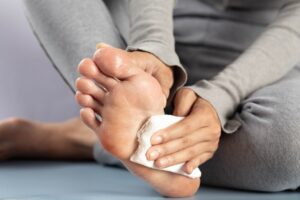Excessive sweating is when you sweat more than what you’d consider to be normal. For example, heavily sweating when you don’t expect to be sweating, like when you’re relaxing. Called hyperhidrosis, it can occur in lots of places in the body, most often the armpits but also the palms of your hands, your feet and face.

Excessive sweating can be embarrassing
Excessive sweating can be embarrassing to manage and may impact a person’s quality of life.
There are two main types of excessive sweating or hyperhidrosis:
- Primary hyperhidrosis: This usually starts in childhood and becomes particularly obvious in adolescence or young adulthood. It is not linked with a medical condition and may run in families.
- Secondary hyperhidrosis: This type is usually as a result of an underlying medical condition or medicine. It can occur suddenly and can affect more areas of the body. Some possible causes are having thyroid issues, hormone changes, like in menopause, diabetes, certain medicines and sometimes infections.
Treatment depends on its how bad it is and what may be causing it.
Botox/Dysport injections found helpful
Botox/Dysport (botulinum toxin) injections have been found to be helpful in blocking the nerves that stimulate sweat glands. Laser Aesthetics offers this treatment mainly for underarm sweating but also for other areas, like the hands.

Topical antiperspirants with aluminum chloride may be effective. These temporarily block sweat glands.
Some medicines, such as anticholinergics, can help reduce sweating but they also come with side effects that people may not tolerate.
Surgery is really a last resort. Some people may have surgery if other options don’t work. Called thoracoscopic sympathectomy (cutting or clamping of the sympathetic nerves that trigger sweating). Surgical procedures do come with risks, so these would have to be carefully weighed up.
Lifestyle changes may also help, like avoiding things that make you sweat more. Like spicy foods, caffeine and alcohol, especially if you can attribute your excessive sweating to hormone changes.
It’s important to talk with an expert. They can help find the cause of the excessive sweating and then recommend what you can try to help you deal with excessive sweating.
Related Posts
It’s simple: good reasons why we recommend a skin consultation
Our skin consultation is $60 – you get that back if you book a treatment within 3 weeks. Money well spent to get the…
What are the best skin-tightening options without surgery?
Six skin-tightening options without surgery to think about: from laser treatment, to skincare and dermaplaning...
Is eating your way to good skin the answer?
A recent study shows that mangoes may help reduce wrinkles over time, as long as you don't eat too many.